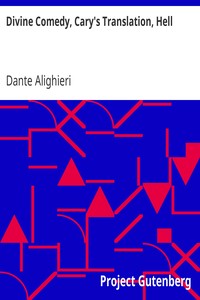Divine Comedy, Cary's Translation, Hell by Dante Alighieri
"Divine Comedy, Cary's Translation, Hell" by Dante Alighieri is an Italian narrative poem written between 1308 and 1321. This first part of the three-part epic follows Dante's harrowing journey through the nine circles of Hell, guided by the Roman poet Virgil. Lost in sin and unable to find salvation, the thirty-five-year-old pilgrim witnesses divine justice as souls receive punishments fitting their earthly transgressions. The work explores medieval Catholic theology while allegorically representing
the soul's recognition and rejection of sin. (This is an automatically generated summary.)
Read or download for free
| Reading Options | Url | Size | |||
|---|---|---|---|---|---|
| Read now! | https://www.gutenberg.org/ebooks/1005.html.images | 260 kB | |||
| EPUB3 (E-readers incl. Send-to-Kindle) | https://www.gutenberg.org/ebooks/1005.epub3.images | 211 kB | |||
| EPUB (older E-readers) | https://www.gutenberg.org/ebooks/1005.epub.images | 212 kB | |||
| EPUB (no images, older E-readers) | https://www.gutenberg.org/ebooks/1005.epub.noimages | 193 kB | |||
| Kindle | https://www.gutenberg.org/ebooks/1005.kf8.images | 401 kB | |||
| older Kindles | https://www.gutenberg.org/ebooks/1005.kindle.images | 361 kB | |||
| Plain Text UTF-8 | https://www.gutenberg.org/ebooks/1005.txt.utf-8 | 229 kB | |||
| Download HTML (zip) | https://www.gutenberg.org/cache/epub/1005/pg1005-h.zip | 176 kB | |||
| There may be more files related to this item. | |||||
Similar Books
About this eBook
| Author | Dante Alighieri, 1265-1321 |
|---|---|
| Translator | Cary, Henry Francis, 1772-1844 |
| Title | Divine Comedy, Cary's Translation, Hell |
| Note | Wikipedia page about this book: en.wikipedia.org/wiki/Divine_Comedy |
| Credits | Judith Smith and Natalie Salter |
| Reading Level | Reading ease score: 82.1 (6th grade). Easy to read. |
| Language | English |
| LoC Class | PQ: Language and Literatures: Romance literatures: French, Italian, Spanish, Portuguese |
| Subject | Hell -- Poetry |
| Subject | Epic poetry, Italian -- Translations into English |
| Subject | Italian poetry -- To 1400 -- Translations into English |
| Category | Text |
| EBook-No. | 1005 |
| Release Date | Aug 7, 2004 |
| Most Recently Updated | Dec 23, 2021 |
| Copyright Status | Public domain in the USA. |
| Downloads | 571 downloads in the last 30 days. |
| Project Gutenberg eBooks are always free! | |

